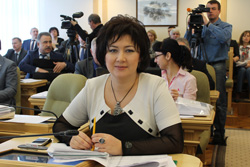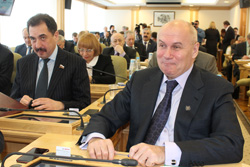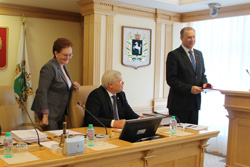
The Legislative Duma of Tomsk Oblast
March 26, 2015. 40th Session of the Legislative Duma of the 5th convocation
 The 40th Session of the Legislative Duma of Tomsk Oblast of the 5th convocation was broadcast online. The agenda of the session and the bills submitted for consideration by the deputies were published on the Duma website beforehand.
The 40th Session of the Legislative Duma of Tomsk Oblast of the 5th convocation was broadcast online. The agenda of the session and the bills submitted for consideration by the deputies were published on the Duma website beforehand.
Speaker Oksana Kozlovskaya opened the session with her traditional address to the Duma deputies. She said, among other things:
“The passing month of March was full of highlights for the region.
An event of strategic importance was a visit by Russian Minister of Education and Science Dmitry Livanov.
He came to Tomsk to participate in the International Council on enhancing competitiveness of leading Russian universities. The council selected four universities out of 14. The group of winners included the Higher School of Economics, the St. Petersburg University of Information Technologies and two Tomsk universities – Tomsk State University and Tomsk Polytechnic University.
In the discussion on the roadmap of the INOTomsk project Dmitry Livanov supported the initiatives proposed by Tomsk Oblast.”
Summary of the Speaker’s speech
SOCIOECONOMIC DEVELOPMENT STRATEGY OF TOMSK OBLAST FOR 2030
The Oblast Duma deputies took one and a half hours to discuss the Tomsk Oblast socioeconomic development strategy for 2030. This is an updated strategy in many ways different from the one adopted back in 2005. The document describes the region’s development priorities, strategy milestones, three development scenarios, and key performance indicators for 2030. It was developed in compliance with the federal and regional legislation.
Deputy Governor for Economy Andrey Antonov was presenting first. He pointed out that the updated strategy responds to the existing economic challenges but the approach to the implementation of the strategy will in many ways depend on the legislative, administrative and financial decisions.
All basic development thrusts and large infrastructural projects which made up the ‘old’ strategy are completed. The INOTomsk 2020 concept was approved at the federal level, the SEZ is functioning, projects are in progress to create clusters of nuclear, agricultural, and forest industry enterprises. Life expectancy increased, personal incomes grew, death and poverty rates went down. There is more housing being built, and physical culture and sports demonstrate growth. The region has become more attractive for investors, the universities have improved their competitive status to a great extent. However, fundamental issues have stayed. The updated strategy focuses on the INOTomsk concept as the primary thrust of the strategic development of Tomsk Oblast.
Vice Rector of the Russian Foreign Trade Academy of the Russian Ministry for Economic Development and member of the Expert Council of the Russian Government Pavel Kadochnikov presented to the deputies the ideology and expectations behind the strategy.
The document is equally important for the region’s today and future. It defines strategic priorities, socioeconomic goals of Tomsk Oblast and key focus areas to implement the goals in the long run. Duma Speaker Oksana Kozlovskaya said that the development strategy is the second most important fundamental document for the region after the Charter of Tomsk Oblast. It describes the region’s development priorities, strategy milestones, three development scenarios, and key performance indicators for 2030. The document was developed in compliance with the federal and regional legislation.
Tomsk Oblast Governor Sergey Zhvachkin thanked the federal developers and experts for their professionalism and diligence towards the region’s future. He noted that the strategy is a live document which takes into account today’s realities. He also said he instructed heads of municipal entities to work on development strategies for the region’s districts and have them completed by the end of 2015.
The Duma deputies passed a resolution to approve the strategy and decided to follow up on its implementation in a year.
OBLAST DUMA DEPUTIES DISCUSSED REPORTS BY REGIONAL OMBUDSMEN FOR HUMAN AND CHILDREN’S RIGHTS
 Tomsk Oblast Ombudsman for Human Rights Elena Kartashova presented statistical data on citizens’ appeals in 2014 and outlined the most pressing issues with human rights in the region.
Tomsk Oblast Ombudsman for Human Rights Elena Kartashova presented statistical data on citizens’ appeals in 2014 and outlined the most pressing issues with human rights in the region.
In 2014, she received 1,315 appeals which exceeds 2013 by 15.7% (1,109 appeals). People are mostly concerned over safety.
In 2014, the regional Ombudsman had 229 visitors. The Ombudsman’s Office provided advice and legal consultations to 428 individuals.
In the municipal entities, Ombudsman’s assistants reviewed 71 appeals which included 4 collective appeals.
More retirees resorted to the Ombudsman’s help in 2014 compared to 2013 – 21.6% vs 10%. The number of appeals from detention facilities went down slightly from 20% to 16.5%. In 2014, there were also 10 appeals from Ukrainian refugees. The number of appeals from families of individuals serving prison sentences grew from 10 in 2013 to 21 in 2014.
Tomsk Oblast Ombudsman for Children Ludmila Eftimovich presented a report on protection of rights and legitimate interests of children in Tomsk Oblast in 2014.
In 2014, she received 1,210 appeals vs 1,140 in 2013 (6.14%). Just like in 2011-2013, the major focus is on protecting children’s right to appropriate living standards to ensure proper development. In 2013, there were 351 appeals on that subject. In 2014, there were 410. Those are appeals about children’s right to housing, timely payment of alimony, compensations under court rulings which affect interests of underage children, proper nourishment and qualified legal assistance in protection of the rights of minors.
In 2014, there were 296 appeals on housing.
The number of appeals on alimony went up significantly from 46 in 2013 to 83 in 2014 (80.4%). The number of complaints about violations of children’s rights to education also grew in 2014 totaling 265.
The deputies took note of the presented information.
INTENTIONAL MIGRATION
Head of the Tomsk Oblast Office of the Federal Migration Service Aleksander Romanov presented a report on the implementation of the national migration policy in the region.
He updated the deputies on the current status of the national migration policy, latest changes in the federal legislation, new mechanisms for hiring foreign labor, and the performance of the Tomsk Migration Center.
The presentation was followed by a Q et A session.
In a discussion around the migration policy Duma deputies Boris Maltsev and Paruir Yavrumyan made a point about the cost of the labor patent which they believe is too high for Tomsk Oblast.
The deputies took the report into account.
44 DAYS UNTIL VICTORY ANNIVERSARY
What is Tomsk Oblast doing to prepare for the celebration of the 70th anniversary of the victory in the Great Patriotic War?
Tomsk Oblast is home to more than 11,000 veterans of the Great Patriotic War of 1941-1945. Among them there are 834 combat veterans, 998 home front veterans, 76 holders of the sign Survivor of the Leningrad Blockade. There are more than 3,000 war widows and 95 concentration camp survivors.
The preparation plan for the celebration was approved by the Oblast Administration on August 29, 2014.
Preparation plan consists of three main blocks:
– Improving the social and economic status of war veterans, including medical assistance
– Patriotic education, outreach activities and cultural events
– Commemorative events (opening memorials on the Victory Day)
EXPANDING CAPACITY OF NURSERY SCHOOLS
Tomsk Oblast is providing governmental support to private nursery schools offering education services under a license.
The Oblast Duma deputies passed in two readings amendments to legislative acts of Tomsk Oblast on certain aspects of pre-school education.
The amendments provide partial financing of private nursery schools by the government.
Funds will be allocated from the regional budget to local budgets. Pre-school educational institutions will be compensated for a portion of their costs including labor, textbooks and educational materials, games and toys. The will not be compensated for building maintenance and utility bills.
The amendments passed in 2015 will impact at least 6 nursery schools in Tomsk and Strezhevoy. It means that 885 preschoolers can be placed in the existing nursery schools in addition to the current capacity. It is proposed to allocate 29.9m rubles from the Oblast budget to finance the law.
REVENUES AND EXPENDITURES GROW EQUALLY
 The Oblast Duma deputies passed amendments to the law on the budget of Tomsk Oblast which increase revenues and expenditures by 29m rubles each, without affecting the deficit. These are funds from the Fund for Assistance to Housing and Public Utilities Reform, allocated to finance major overhauls of apartment blocks.
The Oblast Duma deputies passed amendments to the law on the budget of Tomsk Oblast which increase revenues and expenditures by 29m rubles each, without affecting the deficit. These are funds from the Fund for Assistance to Housing and Public Utilities Reform, allocated to finance major overhauls of apartment blocks.
The amendments also redistribute funds across Tomsk Oblast regional programs by key budget owners under budget classification codes pursuant to the budget classifications updates and changes in spending purposes. The budget is also being updated to include funds to finance additional places in educational institutions by the end of 2015.
The revenues of the amended 2015 budget now total 49.6bn rubles, including tax and non-tax revenues of 41.6bn rubles; non-repayable receipts of 7.9bn rubles. The expenditures total 53.5bn rubles. The deficit is 3.9bn rubles or 9.42% of the revenues net of non-repayable receipts.
The deputies made respective amendments to the law of Tomsk Oblast on investment and innovation activity expenditure. Spending on investments and innovations was reduced by 183m rubles and totals 5.3bn rubles.
CULTURE FOR ETHNIC MINORITIES
The Tomsk Oblast Department of Culture and Tourism will submit to the Government of the Russian Federation information to be added to the list of traditional residence and economic activity areas of ethnic minority groups. The deputies brought the regional law On indigenous population of Tomsk Oblast in compliance with the federal legislation.
At present, the Department of Culture is an executive government body of Tomsk Oblast exercising a limited scope of authority in protecting the primordial living environment and traditional ways of life and economy of ethnic minorities in the region.
The amended law does not require any extra spending from the Oblast budget.
HUNTING AND ENVIRONMENT PROTECTION
The deputies brought certain laws on environment protection in line with the changes in the federal legislation. Scopes of authority were specified for the Administration of Tomsk Oblast, environment protection executive government bodies and regional public institutions.
The deputies passed amendments to the law On environmental audit in Tomsk Oblast in the first reading. The definition of the term ‘environmental audit’ was specified to comply with the federal legislation. The deputies also took into account a request by the regional Environmental Prosecutor’s Office to eliminate redundancy in the civil law relations.
The deputies passed in two readings amendments to the law On hunting and preservation of hunting resources in Tomsk Oblast. They changed the title of public officials who supervise hunting activity in Tomsk Oblast. Their new title is ‘national environmental inspector’. It replaced the title ‘national hunting inspector’.
37 YOUNG HOPEFULS WILL BECOME LAUREATES OF DUMA AWARD
The deputies passed a resolution to award the title of the Laureate of the Award of the Legislative Duma of Tomsk Oblast 2014. There is a plan to introduce two extra awards in the Young Hopefuls nomination which means that 22 young hopefuls and 15 young scientists and students will get the award in 2014. The names of the winners will be announced at the award ceremony in the Drama Theater on April 2.
The 12th contest gathered 313 young scientists and university and school students. This is the largest participation in the history of the contest. Participants also included 53 candidates and 1 doctor of science. Year over year the numbers of those willing to try hand in a fair contest of intellect and talent grows steadily. Over 12 years 2,662 people took part in the contest.
In 2014, participants divided into categories as follows.
Young Hopefuls – 161 participants
Natural Sciences – 47 participants
Technical Sciences – 63 participants
Humanities – 42 participants
In 2014, the geography of the contest covered Tomsk, Seversk, Strezhevoy, and Bakcharsky, Asinovsky, Zyryansky, Kargasoksky, and Krivosheinsky Districts.
